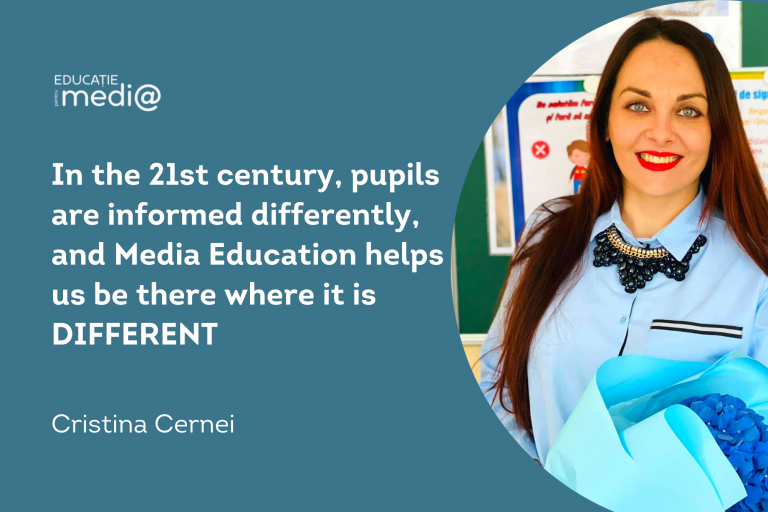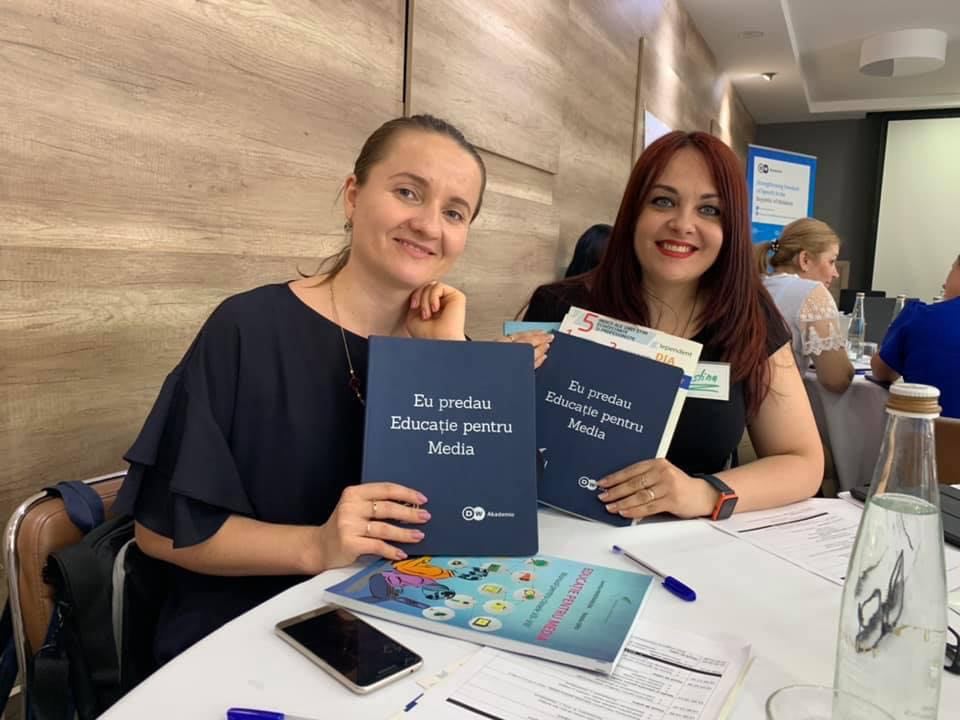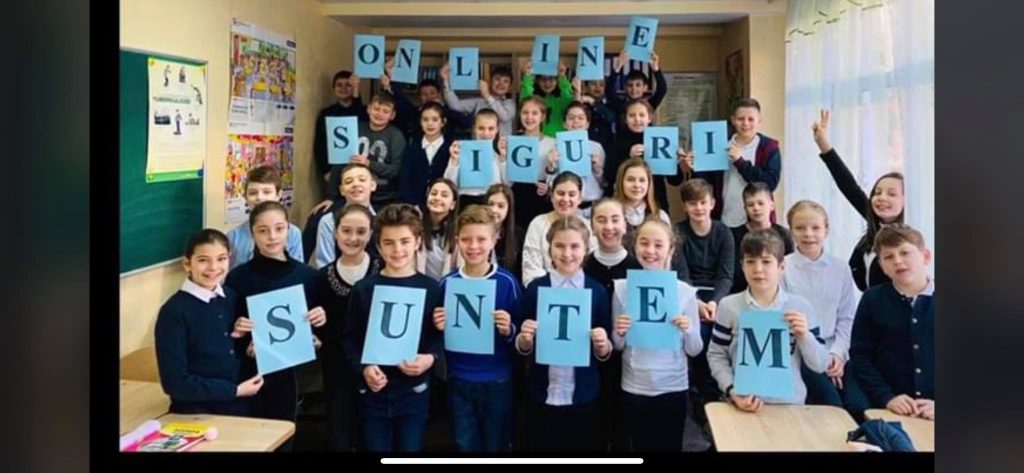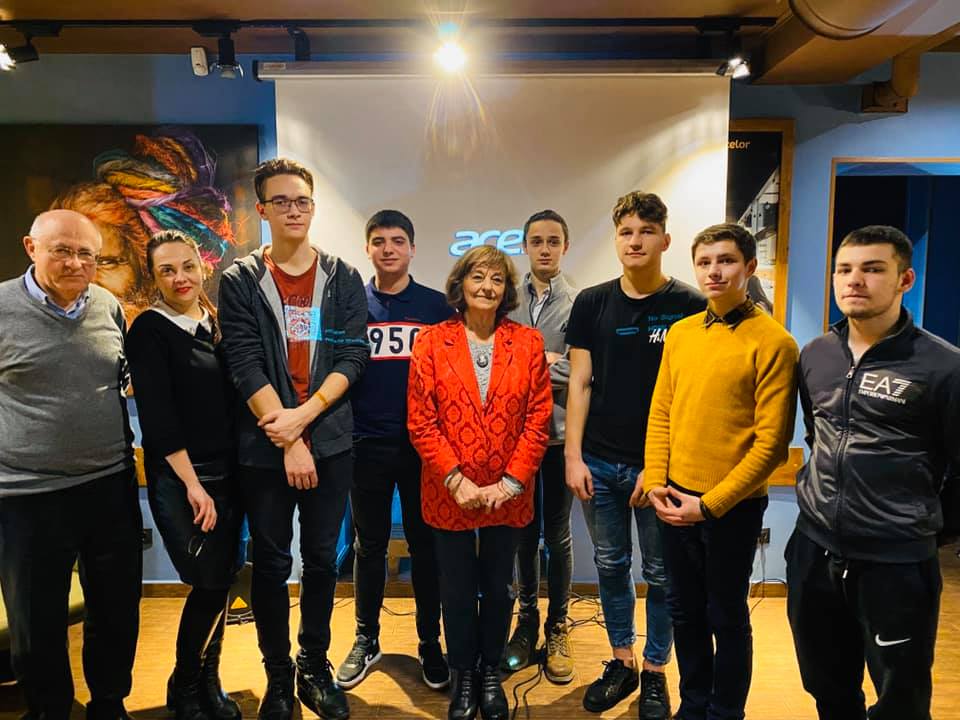In our hasty century, when information overwhelms us from everywhere, it is crucial to be able to discern messages coming from the media space. Without critical thinking and profound fact analysis, we have little chance of raising a young generation with a pronounced sense of responsibility. Media Education is the school subject that helps us by teaching us to “read between the lines,” not to be misinformed, and trains pupils to always ask themselves the question “Why?”
English as a subject involves acquiring language-specific skills, but it does not exclude a critical thinking competency; not to make my pupils feel bored in class, I have always discussed news from various fields with them on the basis of online searches. When I had an opportunity to take part in a training to become able to teach the optional course Media Education, I enrolled supposing I would learn how to find teaching activities easier. Yet I was greatly surprised to find out that I was actually a novice in media literacy issues. The terminology was unfamiliar to me, and my ability to detect fake texts and images turned out to be modest. As I realized I was an uninformed adult I decided that my pupils deserved a teacher well-trained and competent in terms of media content. That was how this quest for developing critical and complex thinking (both for my pupils and for me) started in 2018 when I decided to become a Media Education teacher and promote freedom of speech.
Gymnasium and lyceum pupils I teach Media Education are both curious and confused by the impact of traditional and modern media sources on our thinking and behavior. The hardest issue is being able to prove that, if you are off guard, you can become a victim of informational fast food.
The activities I practice with my pupils always proceed from the idea of how easily one can be misinformed unless we care about who, when, how, and why offers a certain content. Outdoor discussions, case studies, brainstorming, and teamwork are working methods and techniques I use in the classes I teach, both English and Media Education. Due to my permanent involvement in promoting free-thinking, we have taken part in all the contests launched by the IJC during the Media Education Week, and our effort is appreciated. In October 2019, the material titled “Sextortion” was awarded 2nd place in the video contest on the topic of Online Security, and in October 2020, in the contest titled “Disinformation during the Pandemic,” the video prepared by our pupils was also awarded the 2nd place.
Media Education lessons are always based on the phenomenon of surprise. At the demo lesson held on December 3, 2019, I taught such topics as Fake News and Bias in Media. During the lesson, we analyzed these terms and found examples, helping the pupils develop their critical thinking skills. The element of surprise concealed from the pupils was a message sent during the lesson by another teacher upon our previous agreement: she was requesting their personal data. The message seemed to be true, and the pupils did not react in any way. At the end of the lesson, I reminded the pupils about the content of the message, and all of them hurried to fulfill the request without asking themselves what the teacher requested their personal data for. That was when I announced it was not actually true. Only at that moment, the real lesson began. The pupils’ frustration was so obvious that even the guests started wondering what was going on. Those feelings remained in the kids’ memory, and only at that point, the content of the lesson was truly comprehended: one can face manipulation and misinformation at any time, and it can be expected from anyone. Of course, the lesson was memorable; currently, when I order my pupils to do a certain thing, they ask for some proof to see whether they actually need to follow my requests. That is, the goal has been achieved – the pupils have learned to ask themselves questions. 😊
The Media Education course brings all the subjects together under the same “umbrella.” Hence, geography, physics, chemistry, biology, mathematics, the Romanian language and literature, and foreign languages become indispensable: only due to them, we can find out the truth. High school pupils had another challenge doing an exercise in perceiving information: starting from a house, a vase of flowers, and a vehicle, we found chaotically drawn circles and squares. Again, the pupils were shown that distorting information is easy if your attention is distracted.
Topics from Media Education lessons always provoke discussions, and pupils gladly participate in them, selecting reliable sources and distinguishing them from the biased ones. Moreover, the pupils follow the challenges launched by the IJC, expressing their opinions and feelings and trying to “sort the wheat from the chaff.” The pupils’ interest in finding out the truth is also manifested by their participation in the events launched by Radio Free Europe Moldova, such as the Antinostalgia project. On February 6, 2020, we had a chance to talk to Ana Blandiana and well-known journalists and historians who again emphasized the importance of being aware of the phenomena of propaganda, disinformation, and manipulation from a historical perspective.
On February 19, 2020, another demo lesson and one more challenge followed. The topic of the discussion held during the lesson was Decision-Making. We analyzed types of decisions, how and when they are made, what should be taken into consideration and what should not, and also how the media influences our decision-making. Everything was done “with clockwork precision” and included elements of recollection, analysis, assessment, and reflection. However, it was not exactly the issue of decision-making that I wanted the kids to understand. In fact, during the lesson, I intended to demonstrate to the pupils and the visitors the passivity with which we react to certain opinions related to stigma and hatred, for instance, in the case of elderly people. At the end of the lesson, several of those present admitted they were eager to scold me because I was joking about old people, using discriminatory photos, sending a harsh message, and negative comments were heard, too. But all of it had its purpose: to show young people how easily we could be manipulated if a certain subject seems to be true. The elderly can be easily brought into disrepute, especially in the Republic of Moldova. I took that fact into account to show the pupils how some journalists, TV channels, Internet users, or influencers use vulnerable categories to achieve their goals in a rather dishonest way. I explained each manipulation technique, demonstrating how easily it could be applied, especially when we do not expect this to happen.
Since March 2020, the pandemic has demonstrated the need for media literacy. We promoted an informational diet via a video published online; it was prepared by the pupils for whom the term “informational discernment” is something they live by.
On August 7-9, 2020, the 6th Media Hackaton “The Fifth Power” followed: the teams competed to create tools that could be used during Media Education classes. As a team mentor and a jury member, I had to understand several concepts by IT developers, programmers, bloggers, designers, and other media consumers on the notions of school and critical thinking. I am convinced we have to continue our activities for promoting critical thinking with the same intensity.
The cuMINTE podcast on the topic “Media Literacy in School: What Pupils Learn and Why It Matters” with Ana Sarbu, broadcast on the International Podcast Day, summarized the hard work during the academic year completed in the pandemic conditions, and mentioned the start of the school year in full informational uncertainty. The pressing need to continue developing critical thinking via the Media Education course, including by integrating key competencies of this course into the school subject I teach, has guided me to continue developing the 10th-graders’ critical attitude.
From November 2020 to April 2021, the “Onisifor Ghibu” Lyceum in Chisinau participated in another challenge launched by the IJC: “Media Education Is a Priority in my School.” The activities we implemented during this term were focused on convincing our colleagues of the importance of a course in media literacy, establishing partnerships with other schools, and creating bridges connecting pupils, parents, and teachers.
Teaching Media Education has become my lifestyle. Children’s curiosity and ingenuity motivate me to keep constantly searching for sources and relevant courses to become more competent. Today’s pupils deserve the most informed teachers, because they are informed differently, and we must be there where it is DIFFERENT.
Author: Cristina Cernei, English and Media Education teacher, “Onisifor Ghibu” Lyceum, Chisinau
This article is prepared as part of the project “Innovative media literacy tools for media-savvy citizens” implemented by the Independent Journalism Center with the support of the Embassy of Finland in Bucharest.




